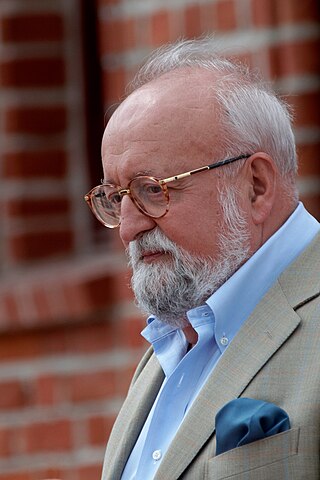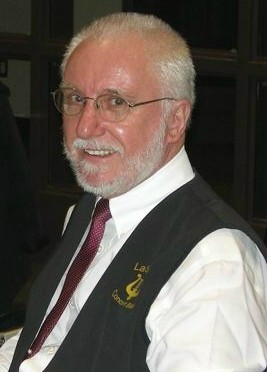Related Research Articles

Krzysztof Eugeniusz Penderecki was a Polish composer and conductor. His best-known works include Threnody to the Victims of Hiroshima, Symphony No. 3, his St Luke Passion, Polish Requiem, Anaklasis and Utrenja. His oeuvre includes five operas, eight symphonies and other orchestral pieces, a variety of instrumental concertos, choral settings of mainly religious texts, as well as chamber and instrumental works.

Milton Byron Babbitt was an American composer, music theorist, mathematician, and teacher. He was a Pulitzer Prize and MacArthur Fellowship recipient, recognized for his serial and electronic music.
A piano sextet is a composition for piano and five other musical instruments, or a group of six musicians who perform such works. There is no standard grouping of instruments with that name, and compared to the string quartet or piano quintet literature, relatively few such compositions exist. The best-known piano sextet is probably the Sextet by Poulenc, one of the pinnacles of the wind and piano repertoire. Chausson's Concert is widely regarded as one of the masterpieces of French strings and piano chamber music literature.
Arnold Atkinson Cooke was a British composer, a pupil of Paul Hindemith. He wrote a considerable amount of chamber music, including five string quartets and many instrumental sonatas, much of which is only now becoming accessible through modern recordings. Cooke also composed two operas, six symphonies and several concertos.
Tristan Keuris was a Dutch composer.

Volker David Kirchner was a German composer and violist. After studies of violin and composition at the Peter Cornelius Conservatory, the Hochschule für Musik Köln and the Hochschule für Musik Detmold, he worked for decades as a violist in the Radio-Sinfonie-Orchester Frankfurt. He was simultaneously the violist in the Kehr Trio founded by his violin teacher Günter Kehr, and a composer of incidental music at the Hessisches Staatstheater Wiesbaden.
Gary Alan Kulesha is a Canadian composer, pianist, conductor, and educator. Since 1995, he has been Composer Advisor to the Toronto Symphony Orchestra. He has been Composer-in-Residence with the Kitchener-Waterloo Symphony (1988–1992) and the Canadian Opera Company (1993–1995). He was awarded the National Arts Centre Orchestra Composer Award in 2002.

The Symphony No. 3 is a symphony in five movements composed between 1988 and 1995 by Krzysztof Penderecki. It was commissioned and completed for the centenary of the Munich Philharmonic. Its earliest version, Passacaglia and Rondo, premiered at the International Music Festival Week in Lucerne, Switzerland, on August 20, 1988. It was performed by the Lucerne Festival Orchestra and conducted by Penderecki. The full symphony premiered in Munich on 8 December 1995, performed by the Munich Philharmonic, again conducted by the composer.
Rafał Stradomski is a Polish composer of contemporary classical music, pianist and writer.

Marek Stachowski was a Polish composer. He received many awards and won many competitions for composers, including first prize at the K. Szymanowski Competition in 1974.
The Sextet is a two-movement composition for clarinet, horn, violin, viola, cello, and piano by Polish composer Krzysztof Penderecki. The composition was written in 2000 and is, according to some critics, the composer's most substantial chamber work.

The Suite is a composition for solo cello by Polish composer Krzysztof Penderecki. The piece is well known for its typical chromatic melodies and for its recurrent use of pizzicati and col legno.
The Partita for Harpsichord and Orchestra, sometimes also referred to as Partita for Harpsichord, Electric Guitar, Bass Guitar, Harp, Double Bass, and Chamber Orchestra or Harpsichord Concerto, is a composition by Polish composer Krzysztof Penderecki. It was finished in 1971 and is Penderecki's only major composition for a harpsichord soloist.

The Symphony No. 1 by Polish composer Krzysztof Penderecki was composed in 1973. It was published by Polish Music Publishing House and Schott Music and has never been expanded or revised.

The Dream of Jacob, also referred to as The Awakening of Jacob, is a composition by Polish composer Krzysztof Penderecki. It is scored for large orchestra and was finished in 1974.
Emanations, also referred to by its original German title Emanationen or by its Polish title Emanacje, is a composition for two orchestras by Polish composer Krzysztof Penderecki. Composed in 1958, it is one of his early compositions.
The Clarinet Quartet, also known as Quartet for Clarinet and String Trio, is a work for clarinet, violin, viola, and cello by Polish composer Krzysztof Penderecki. It was finished in 1993.
Three Miniatures for Clarinet and Piano is an early work by Polish composer Krzysztof Penderecki. It was finished in 1956, but was premiered four years later.

(Ernest) John Robertson is a New Zealand born Canadian composer of concert music. He received his preliminary musical educational as part of his schooling in New Zealand. Upon emigrating to Canada in 1967 he took a position in the general insurance business, but in the mid 1970s he embarked on a course of private study in composition and counterpoint at the Royal Conservatory of Music in Toronto with Dr Sam Dolin. In 1987, the entry in the Composer's Competition won him a performance of his Variations for small orchestra Op 14. After his retirement, he has concentrated on getting his work heard more broadly and, since this moment, his music has been heard in Canada, Australia, Mexico, the UK, Sweden and Bulgaria. In 2014 after some orchestral pieces of his were played in Ruse, Bulgaria, the Ruse State Opera asked him to write an opera and the one hour long Orpheus was staged there in June 2015 and was revived in February and May 2016 and in June 2017.A companion piece for Orpheus, the dance piece with actors Lady Jane, appeared in 2017 and was seen in a new production in Stara Zagora, Bulgaria, in August 2022 and repeated a month later.
References
- ↑ Whitehouse, Richard. "About this Recording 8.557052 – PENDERECKI: Sextet / Clarinet Quartet / Cello Divertimento". Naxos Digital Services. Retrieved 23 February 2014.
- ↑ "Prelude for solo clarinet". Nadorowy Instytut Audiowizualny. Retrieved 23 February 2014.
- 1 2 3 4 5 6 Bylander, Cindy (30 December 2004). Krzysztof Penderecki : a bio-bibliography. Westport: Greenwood Publishing Group, Inc. ISBN 0-313-25658-6.
- ↑ "Blue" Gene Tyranny. "Krzysztof Penderecki Prelude for clarinet solo in B flat major". Rovi Corporation. Retrieved 23 February 2014.
- ↑ "PENDERECKI: Sextet / Clarinet Quartet / Cello Divertimento". Naxos Digital Services. Retrieved 23 February 2014.